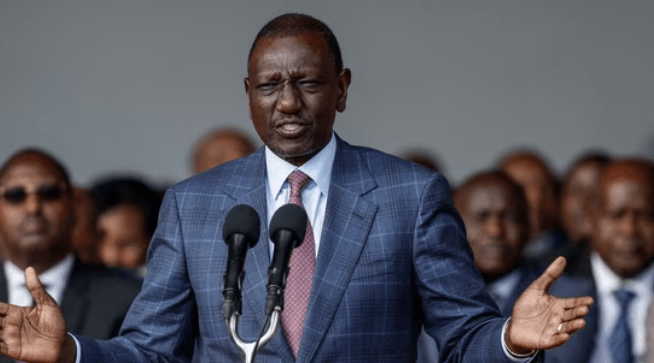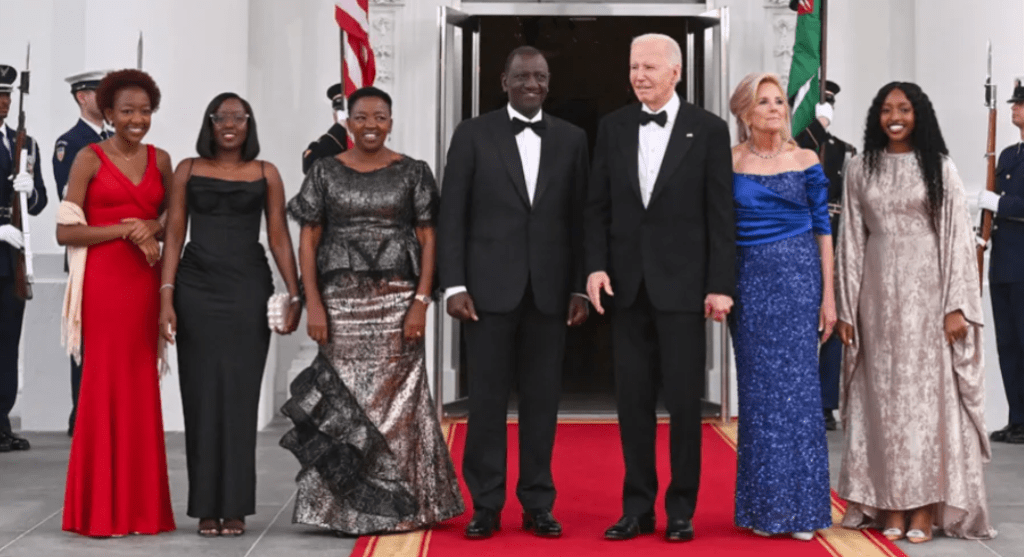The president of Kenya, William Ruto, has rejected a bill to raise taxes a day after violent protests erupted across the country following its approval by parliament.
Ruto’s unexpected decision not to sign the finance bill came after violent clashes between police and protesters at the Kenyan assembly and nationwide left at least 23 people dead and scores wounded, according to medics.
“Listening keenly to the people of Kenya, who have said loudly that they want nothing to do with this finance bill 2024, I concede. And therefore, I will not sign the 2024 finance bill, and it shall subsequently be withdrawn,” he said in a press briefing in Nairobi.
The climbdown is seen as a major setback for Ruto, who came to power vowing to help Kenyans cope with rising costs but has faced widespread opposition, especially from the youth, against his latest reforms.

Press Briefing, State House, Nairobi. https://t.co/BYWljpfcGT
— William Samoei Ruto, PhD (@WilliamsRuto) June 26, 2024
In an attempt to further defuse the volatile situation, Ruto proposed a dialogue with young people, civil society, religious organisations, and professional bodies on the bill.
He also directed austerity measures to reduce expenditure in his office, the executive, parliament, as well as in the judiciary and county governments “to ensure that we do live within our means, respecting the very loud message that is coming from the people of Kenya”.
The move is considered a victory for the week-old protest movement that grew from online condemnations of tax increases into mass rallies demanding a political overhaul, in the most serious crisis of Ruto’s two-year-old presidency.
Kenya, East Africa’s largest economy and a pillar of peace in a relatively turbulent region, is reeling from Tuesday’s protests. Thousands of people gathered in Nairobi, the capital, with some storming into parliament and other government offices, setting parts of them on fire.
Police opened fire and shot teargas at protesters. At least 23 people were killed and another 30 were treated for bullet wounds, according to the Kenya Medical Association.
Protests also took place in other cities and towns across the country. Last week, one person was killed and at least 200 others were injured in demonstrations, according to human rights groups and the Independent Policing Oversight Authority, a police watchdog.
In an unusual move, Kenya’s defence minister, Aden Duale, on Tuesday announced the deployment of the military to support police “in response to the security emergency caused by the ongoing violent protests”. Kenya’s high court on Wednesday ordered the military deployment suspended after a challenge by the Kenya Law Society.
Guys it’s not over yet. They want to pass this bill that will make it almost impossible to protest like we have been doing. And he’s said it himself that they will try again next year. If this bill passes, next year we won’t have a voice to reject this finance bill. pic.twitter.com/g8A6ZaqJGg
— Monka (@MonyqueXO) June 26, 2024
Before backing down, Ruto had described Tuesday’s events as “treasonous” and blamed the violence on “criminals”.
On Wednesday, Ruto acknowledged the deaths, calling it an “unfortunate situation”, and offered condolences. He said about 200 people had been wounded.
The protests have been driven largely by youth-led digital activism, with young Kenyans using X, TikTok, and other platforms to oppose the bill, crowdfund, organise, and mobilise demonstrations.
On Tuesday, nongovernmental organisations reported 21 abductions and disappearances by officers over the past 24 hours, with some of the victims having been vocal on social media about the planned protests.
Nicodemus Minde, a researcher with the Institute for Security Studies in Nairobi, said lingering questions about those killed and injured during the protests, as well as those missing, could mean the protests continue.
Protesters had earlier vowed to keep up their demonstrations in messages on social media using the hashtag #tupatanethursday, or “see you on Thursday” in a mix of Swahili and English.
Posts on social media urged people to occupy State House, the president’s office and residence, on Thursday, and the local offices of the World Bank and the International Monetary Fund (IMF) on Friday.
Heavily armed police patrolled the streets of Nairobi on Wednesday, which were quieter than usual.
Edith Wanjiku, the mother of a teenager killed, told journalists at a morgue that the police who shot her 19-year-old son should be charged with murder because he had been unarmed.
“He had just completed school and was peacefully protesting,” she said.
Opposition leader Raila Odinga called for dialogue, asserting that Kenya’s constitution had been suspended. “Kenya cannot afford to kill its children just because the children are asking for food, jobs and a listening ear,” he said in a statement.

